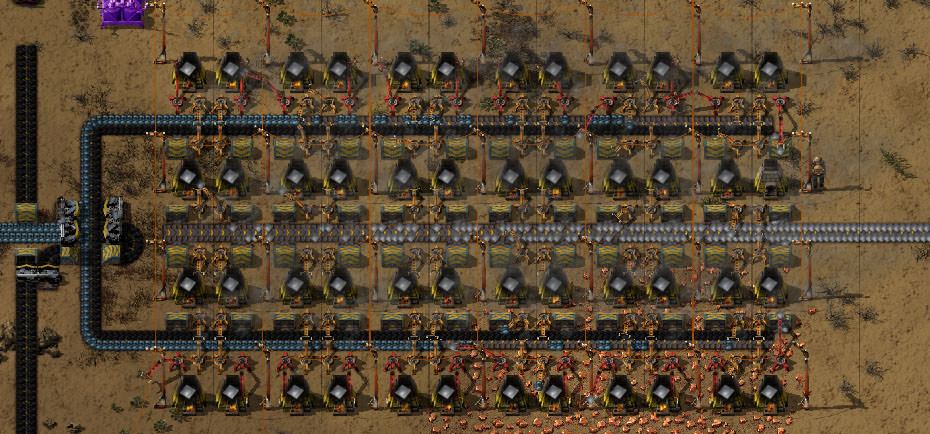The answers will of course be very useful to me, but I suspect this thread will become useful to many new players as the concepts are critical to making a good base.
1) How wide should it be? Most of the information I found seems to recommend 7-8 lanes of 4 tracks each, so my plan is for 8. Is that right, or should I reserve more?
2) Of those, I the consensus seems to be for a minimum of these tracks: 4 green circuits, 4 iron, 4 copper, 2 steel. But I see hints that suggest putting more of those ores/products on the bus. What is the best-practice number of those lanes?
3) Since a well designed smelter set will saturate a bus lane, I am planning one smelter sets per lane coomposed of 16x2 stone furnaces / yellow belt that I will later upgrade to electric furnaces and red belt (using a design that allows direct replacement). On the back side of the smelter sets I plan to setup a railway so that they can receive ores that way once I exhaust the local deposits. Does this sound right?
4) For green circuit production I've seen that to saturate 4 belts I'll need 4 tracks of iron plate and 6 of copper. That almost would exhaust my bus!!! Is it safe to say that green circuit production needs its own dedicated smelter sets and iron/copper supply?
5) For other products on the bus there seems to be a lot of disagreement of what it should be. For example, some say to include a lane each of raw stone and stone bricks, others say no. So, what other products need to be on the bus and why?
6) My initial red/green Research is fully self-contained with its own small supply of ores and smelting. When I build the new "all research types" setup, should I hang it off the bus, or also make it self-contained?
7) Oil seems far from my bus (4-6 chunks away). Should I build the Oil/Chemical processing plant near the oilfield or off the bus, or some things locally and some off the bus? For transport, pipe the products to the bus, or by train and offload it at a Chemical plant near the bus?
8) I know I will eventually want a "build everything" mall hanging off the bus. But I noticed that I need certain resources a lot (like track, yellow inserters. ammo, green circuits, small electric poles, furnaces, etc) long before I reach the point of building the main mall. Would it make sense if I planned my bus before I even get off the stone/manual age, use it early, and hang a mini-mall off it? My thought is that each time I notice I need something routinely I'd build a quick assembly setup for it, with all the chests hanging off to the same side for easy access.
I realize this is a lot, please don't feel obliged to try to answer all the questions. Loose answers work too



